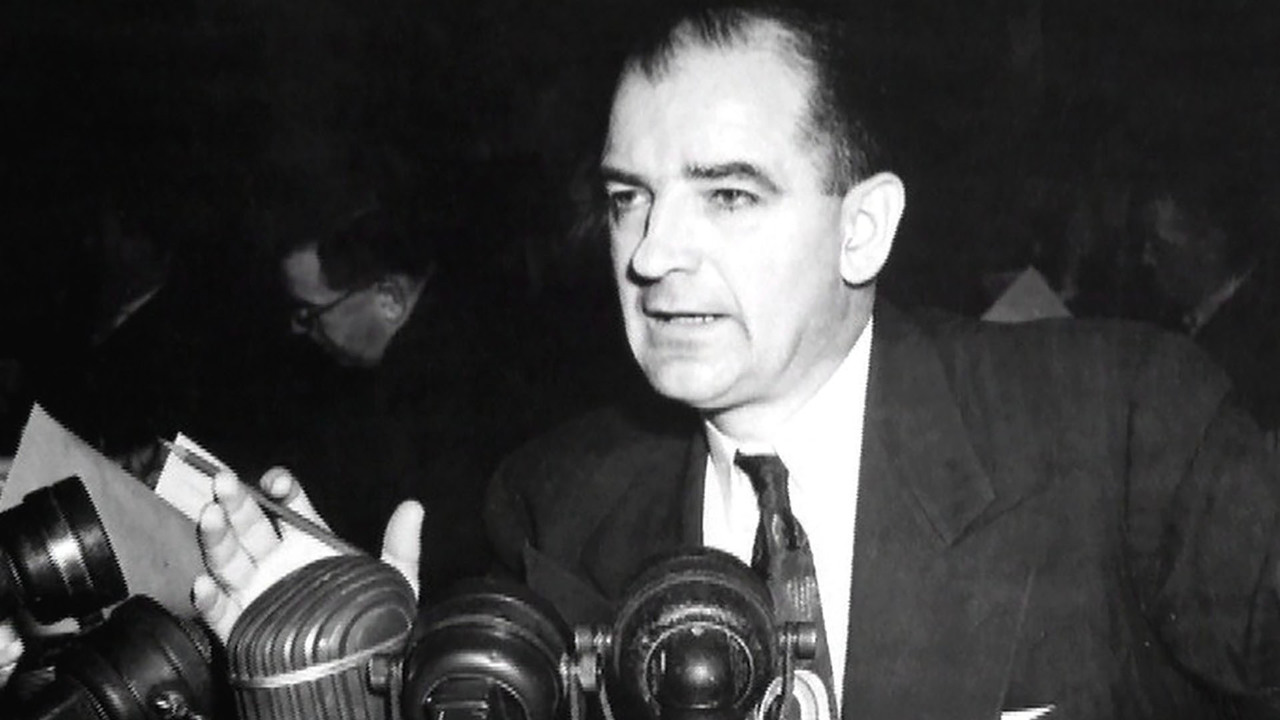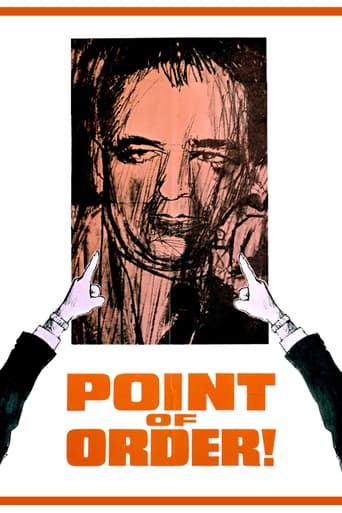



the leading man is my tpye
Such a frustrating disappointment
Let me be very fair here, this is not the best movie in my opinion. But, this movie is fun, it has purpose and is very enjoyable to watch.
View MoreThe movie is wonderful and true, an act of love in all its contradictions and complexity
View MoreApparently the DVD's as of 2012 are expensive to obtain. My used one ran 50 bucks. Anyway, this is a slice of history that riveted the nation in those early days of coast-to-coast TV. Reviewer Mike Rice does a good job of filling in the background, so there's no need to repeat it here. The documentary is an edited version of the 1954 senate hearings. On the whole, editing is to film footage what the eraser is to penciled composition. In short, astute editing can be used to create many, sometimes incompatible, effects. Now, I have no reason to believe editing was used here to skew any particular effect, but its potential for mischief is well to keep in mind.Maybe it's my seven decades of breathing, but I did have some trouble following the narrative, and could have used some helpful bridges (a voice-over or graphics) to flesh out better continuity, especially when the topic of the Hearings changes. But whatever the difficulty, the legal fencing between experts is fascinating to watch. Note, for example, how no one on either side responds with a simple yes or no.Naturally, most viewers approach the material with their own political pre-conceptions. I have mine, still I want to venture several observations not rooted, I believe, in my politics. Firstly, I don't recall seeing clips of McCarthy smiling before; here he at times appears almost affable, contrary to his usual sour image. Secondly, Welch is one eloquent attorney who really knows how to think on his feet. The usual brief clips of "Have you no sense of decency" only hint at those abilities. Then too, he's so unprepossessing looking you don't expect him to dominate the way he sometimes does. Lastly, I'd really like to know who concocted that phony letter from Hoover, along with the cropped photo. I may have missed something, but I don't believe those questions are resolved in the footage.Be that as it may, Point of Order is real life dramatics at its most fascinating and remains an important slice of post-war history, from which the junior senator from Wisconsin never really recovered.
View More"Point of Order" is an example of a modern-day Eisenstein. It took material from the recesses of American history, recombined and made a film with complete sense, albeit weighted against McCarthy. It is an excellent piece of work but then it shows quite well how evidence reassembled can make someone seem guilty. That is the virtuosity of the filmmaker.Unlike one of the reviewers, I think that McCarthy was a monster, a publicity-seeking man out of control who thought absolutely nothing about the lives he ruined or attempted to ruin, however, falsely but I'm begging the issue here. The film is marvelously well put together and de Antonio possesses remarkable technique to make things seem "alive". Again it's easy to see things in black and white ideologically but the film within itself is impeccable.
View MoreDocumentarian Emile De Antonio dug aging ABC TV film footage of the 1954 Army McCarthy Hearings from a warehouse. Kinescopes are created by recording live images from a TV monitor. Early TV heritage is preserved on this primitive film. De Antonio simply edited the film. The 93minute Point of Order was released in 1963. It is the watch phrase of an ambitious and drunken Joe McCarthy, bound for glory. Seeing these creaky black and white kinescopes from 1954, summons memories of American Politics back then. I was nine then, but the drama of the hearings would have been apparent to a six year old. Americans were innocents then about TV.It was the last year the GOP held control of both houses of Congress. The Army McCarthy hearings signaled the decline of the the Congressional GOP for the next four decades. Looking back the groundwork for undoing Joe McCarthy was laid before the hearings even began.Karl Mundt of S. Dakota (Rep) Chaired the Hearings in front of the Armed Services Committee. Joe and Chief Counsel Roy Cohn could abuse or amuse, at will, in Joe's subcommittee. But Eisenhower, the Press, Joe's own party, were colluding to stage the Hearings on a level playing field.ABC ran the McCarthy hearings live mornings and afternoons when the networks were dark and they had no programming to show. The TV network founded by Leonard Goldenson from the ashes of the NBC Blue Radio network, was the smallest of them.There were no commercials. The broadcast was run on a sustaining basis, without ads.CBS and NBC joined ABC the next day. The Hearings were gathering a substantial audience. The daily Army Hearings quickly became the first riveting live news event of the TV age.In 1954, there was almost no live TV news. Only two network newscasts, John Cameron Swayze's Camel Caravan on NBC and Douglas Edwards and the News on CBS ran for only 15 minutes.Joseph Welch, the Army Counsel, a Boston trial lawyer, cast himself as the fair-haired country boy of the Hearings. Welch wasn't going to play the rube though. Roy Cohn and Joe McCarthy would be the foils of this TV show.McCarthy would drone on in a deadening monolithic style, a manner whose subtext Welch quickly read. The Boston Barrister focused his disarming persona on the soft underbelly of the McCarthy style with devastating effect.Welch showed he could readily switch from hayseed to moralist on a dime. The lawyer had watched Henry Fonda's Abe Lincoln in John Ford's Young Mr. Lincoln too many times. Welch's homespun, Abe-like discourse would dominate the Hearings.Despite Welch's seeming lack of charisma, he was as spellbinding a figure on 1954 television as any pro working in the medium of Milton Berle, Bishop Sheen and Buffalo Bob Smith. Used to conducting hearings in the drab public affairs nether world of the newspaper-driven fifties, McCarthy didn't catch on to the Welch Style, understand it or try to adapt to it. Joseph Welch was eating McCarthy and Cohn alive any time he felt like it. Senators Scoop Jackson, Karl Mundt and others were at a loss for words amidst the dramatics of those 36 days. Only Missouri democrat Stuart Symington was able to capture some of the method of the balding Boston lawyer in the last sessions.When events presented themselves, Welch would virtually take over the Hearings, outwitting committee members, witnesses, undoing or green-lighting exhibit presentations, thwarting and disturbing the tired theatrics of McCarthy and Cohn. Point of Order is a dazzling TV spectacular with a single spellbinder at its center, a master of a medium he had no experience of.As the Hearings ground to a close, Cohn and McCarthy were resigned to their tragedy. Each exchange with Welch found the two men's noses bloodied once again. Joe and Roy belatedly recognized themselves as bit players in Welch's Great Political Soap Opera. The Two knew toward the end they were powerless to prevent impending doom. You could see the despair etched in their faces.The old tapes are now History. Welch seems an unlikely choice as Counsel for a stodgy Army. McCarthy and Cohn, charged with explaining why Private David Schine should be permanently furloughed from the Army to work with the Communist-Hunting McCarthy, were drunk with power. But it seems like a nobrainer that the Army should win. Fear of the Communist Menace turned common sense on its head during the four years Joe McCarthy rose and spectacularly fell. Maybe it is more like now than many today are willing to admit.The next year, two playwrights captured the essence of Counselor Welch in a new play. A Welch-like Clarence Darrow character was pitted against an orator and moralist modeled on William Jennings Bryan in Inherit the Wind, based on the 1927 Scopes Trial. The Darrow Spencer Tracy portrayed in the 1960 movie would incorporate both aspects of the Welch personaIn 1956 the first half hour nightly newscast with Chet Huntley and David Brinkley premiered on NBC and became a roaring success. In 1957 Joe McCarthy died of acute cirrhosis. Cohn would become a successful lawyer himself. He died of AIDs in the late eighties. McCarthy's other subcommittee counsel Bobby Kennedy and his brother Jack would learn from Welch. The brothers and their rogue father Joe Kennedy had been disciples of McCarthy the Witch Hunter. They were likely dismayed at the outcome of the Hearings but impressed by the Welch Performance. The Kennedys would find ways to bottle his magic and transform American Politics, Culture and Public Affairs after 1960. You could argue that the genie-in-a-bottle Welch uncorked in those grainy TV hearings long ago transformed American life.
View MoreRoy Cohn keeps popping up in American culture, from his fictionalized roles in "ANGELS IN America"-- as interpreted by Al Pacino (actor), Tony Kushner (playwrite), and Mike Nichols (director) --and Kurt Vonnegut's "JAILBIRD," to his actual deeds as documented by the likes of Emile de Antonio here in "POINT OF ORDER." Although there have been some attempts to put Cohn in perspective-- Frank Pierson's awful HBO film, "CITIZEN COHN," comes to mind (with James Woods' cartoon performance), I believe we've yet to see anything approaching a definitive look at him and his legacy.As for McCarthy and McCarthyism, "POINT OF ORDER" stands as an excellent non-fiction introduction to the beginning of their ends. It's great drama, and it's full of truth. And that is all. "POINT OF ORDER" is where one can start, yet not where one may find real answers.
View More